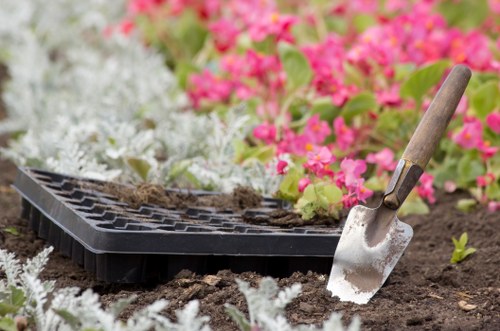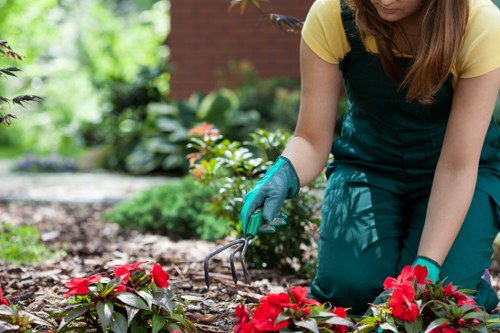Driveway Algae Removal in Finsbury Park

Maintaining a clean and safe driveway is essential for any homeowner in Finsbury Park. One common issue that many residents face is the growth of algae, which can make the driveway slippery and unattractive. Algae thrives in damp, shaded areas, making driveways an ideal environment for its growth.
Understanding the causes of algae growth is the first step towards effective removal. Algae often appears as dark, green, or black patches on the driveway surface. It not only detracts from the appearance of your property but can also pose a safety hazard, especially when the driveway becomes slick after rain or dew.
Fortunately, there are several methods available for removing algae from driveways. Whether you prefer a DIY approach or hiring a professional service, addressing the issue promptly can prevent further damage and maintain the curb appeal of your home.

Why Algae Grows on Driveways
Algae thrives in environments where moisture, shade, and organic material are abundant. Driveways in Finsbury Park often provide these ideal conditions due to frequent rainfall and the presence of nearby vegetation.
Cars can contribute to algae growth by leaving behind dirt and moisture. Additionally, the type of driveway surface plays a significant role; porous materials like concrete or asphalt can retain moisture, creating a perfect breeding ground for algae.
Addressing these factors can help prevent algae from taking hold. Regular cleaning and maintenance are crucial in keeping your driveway algae-free.

Effective Methods for Algae Removal
There are various techniques to remove algae from driveways, ranging from natural remedies to chemical treatments. Let's explore some of the most effective methods:
1. Pressure Washing
Using a pressure washer is one of the most efficient ways to eliminate algae. The high-pressure water jets can scrub away the algae without the need for harsh chemicals. However, it's essential to use the correct pressure setting to avoid damaging the driveway surface.
For best results, start from the highest point and work your way down, ensuring that all affected areas are thoroughly cleaned.
2. Baking Soda and Vinegar
This natural solution is both eco-friendly and effective. Mix equal parts of baking soda and vinegar to create a paste. Apply the mixture to the algae-affected areas and let it sit for about 15 minutes before scrubbing with a brush.
Rinse the driveway with water once you've removed the algae. This method helps kill the algae without harming the environment.
3. Bleach Solution
For stubborn algae stains, a bleach solution can be used. Mix one part bleach with three parts water and apply it to the driveway. Allow the solution to sit for about 10-15 minutes before scrubbing and rinsing thoroughly.
While effective, bleach can be harsh on surfaces and the surrounding vegetation, so use it with caution.

Preventing Future Algae Growth
Once you've removed the existing algae, it's important to take steps to prevent its return. Here are some preventive measures you can implement:
- Improve Drainage: Ensure that rainwater drains away from your driveway to reduce moisture retention.
- Increase Sunlight Exposure: Trim overhanging branches and remove obstructions that cast shadows on your driveway.
- Regular Maintenance: Sweep and wash your driveway regularly to remove dirt and debris that can promote algae growth.
- Seal the Driveway: Applying a sealant can create a barrier that inhibits algae from penetrating the surface.
Implementing these strategies can significantly reduce the likelihood of algae returning to your driveway.
Choosing the Right Cleaning Schedule
Establishing a regular cleaning routine is key to keeping algae at bay. Depending on your local climate and the specific conditions of your driveway, you might need to clean more frequently during damp or shaded seasons.

Hiring Professional Algae Removal Services
While DIY methods can be effective, some situations may require professional assistance. Professional algae removal services in Finsbury Park offer expertise and equipment that ensure thorough cleaning.
When choosing a service provider, consider the following factors:
- Experience: Look for companies with a proven track record in algae removal.
- Reputation: Read reviews and ask for references to gauge customer satisfaction.
- Eco-Friendly Practices: Opt for services that use environmentally safe products.
- Cost: Compare quotes to find a service that fits your budget.
Investing in professional services can save time and ensure that your driveway remains clean and safe.
Benefits of Professional Services
Professionals bring specialized knowledge and tools to the table. They can identify underlying issues that contribute to algae growth and address them effectively.
Additionally, hiring experts can extend the lifespan of your driveway by preventing damage caused by prolonged algae exposure.
Local Relevance: Areas Near Finsbury Park
Finsbury Park is surrounded by several vibrant neighborhoods, each with its unique characteristics and needs regarding driveway maintenance. Here are some of the closest areas to Finsbury Park that may require algae removal services:
- Stratford - Known for its bustling markets and transport hubs, Stratford has many residential driveways susceptible to algae growth due to high foot traffic and moisture from nearby waterways.
- Canonbury - This leafy area benefits from ample sunlight, but heavy rains can lead to algae formation on driveways.
- Wood Green - A commercial hub with numerous parking areas where algae can flourish in shaded spots.
- Highbury - Characterized by Victorian terraces, Highbury driveways often require gentle cleaning methods to preserve their aesthetic appeal.
- Clissold - Proximity to parks and recreational areas means increased moisture, making algae a common issue.
- Islington - A mix of residential and commercial properties, Islington driveways need regular maintenance to prevent algae buildup.
- Crouch End - With its eclectic mix of homes, Crouch End areas often seek both DIY and professional algae removal solutions.
- Muswell Hill - Driveways here are well-maintained, but occasional algae growth requires prompt attention.
- Victoria Park - Known for its extensive green spaces, driveways near Victoria Park can be prone to moisture-related algae issues.
- Seven Sisters - A diverse area with various driveway surfaces that may need tailored algae removal approaches.
- Highgate - Prestigious homes with elaborate driveway designs that benefit from professional algae cleaning services.
- Pimlico - Although a bit further, Pimlico's driveways also face similar algae challenges during wet seasons.
- Kentish Town - An area with a mix of old and new driveways, all requiring regular upkeep to prevent algae growth.
- Swiss Cottage - Driveways in Swiss Cottage need effective algae removal to maintain their pristine look.
- Regent’s Park - Close to expansive parklands, driveways here are frequently exposed to moisture and debris, fostering algae growth.
Choosing the Best Algae Removal Method for Your Driveway
Selecting the right method depends on various factors, including the extent of algae growth, driveway material, and environmental considerations. Here are some tips to help you decide:
- Assess the Severity: Light algae stains can often be handled with DIY methods, while severe infestations may require professional intervention.
- Consider the Surface: Different driveway materials respond better to specific cleaning techniques. For example, pressure washing is suitable for concrete but may damage softer surfaces.
- Environmental Impact: Opt for eco-friendly solutions like baking soda and vinegar to minimize your environmental footprint.
- Budget: DIY methods are generally more cost-effective, whereas professional services offer comprehensive solutions at a higher price point.
By weighing these factors, you can choose the most effective and appropriate algae removal strategy for your driveway.
Long-Term Maintenance Tips
After removing the algae, maintaining a clean driveway requires ongoing effort. Here are some long-term tips:
- Regularly sweep the driveway to remove debris that can trap moisture.
- Inspect for and repair any cracks or damages that could harbor algae.
- Apply sealants every few years to create a protective barrier against moisture.
- Trim any nearby vegetation to reduce shade and improve sunlight exposure.
The Importance of Timely Algae Removal
Addressing algae growth promptly is crucial to prevent damage and maintain the aesthetic appeal of your driveway. Delayed removal can lead to:
- Surface Damage: Algae can cause the driveway surface to deteriorate over time, leading to cracks and potholes.
- Safety Hazards: Slippery algae patches increase the risk of accidents, especially during wet conditions.
- Decreased Property Value: A dirty and poorly maintained driveway can negatively impact your home's curb appeal and value.
- Increased Cleaning Costs: The longer algae is left unchecked, the more effort and resources are required to remove it.
Regular maintenance and timely intervention are essential in preventing these issues.
Signs You Need Algae Removal
Being proactive about algae removal can save time and money in the long run. Watch out for these signs:
- Visible dark patches or slimy surfaces on the driveway.
- Increased slipperiness during or after rainfall.
- Discoloration or staining of the driveway material.
- Unpleasant odors emanating from the driveway area.
If you notice any of these symptoms, it's time to take action.
Eco-Friendly Algae Removal Solutions
Many homeowners in Finsbury Park are conscious of the environmental impact of their cleaning practices. Eco-friendly algae removal methods offer effective results without harming the ecosystem.
- Baking Soda and Vinegar: As mentioned earlier, this natural combination is safe for both your driveway and the environment.
- Hydrogen Peroxide: A mild oxidizer that can kill algae without the use of harsh chemicals. Mix it with water and apply to affected areas.
- Green Cleaning Products: There are commercial eco-friendly algae removers available that are biodegradable and non-toxic.
Choosing eco-friendly options helps protect local flora and fauna while keeping your driveway clean.
Benefits of Using Natural Cleaners
Natural cleaners are not only safer for the environment but also for your family and pets. They reduce the risk of chemical runoff into gardens and nearby water sources, promoting a healthier local ecosystem.
Additionally, natural cleaning agents are often more cost-effective and readily available, making them a practical choice for many homeowners.
Common Mistakes to Avoid
When removing algae from your driveway, it's important to avoid certain pitfalls that can exacerbate the problem or damage your property:
- Using Excessive Pressure: Too much pressure can erode the driveway surface, leading to costly repairs.
- Ignoring Safety Precautions: Always wear protective gear when handling cleaning solutions, especially chemicals like bleach.
- Skipping Regular Maintenance: Failing to maintain your driveway increases the likelihood of recurring algae growth.
- Not Addressing Underlying Issues: Moisture retention and poor drainage contribute to algae growth. Address these problems to prevent future issues.
By avoiding these mistakes, you can ensure effective and safe algae removal.
The Importance of Following Instructions
When using any cleaning method or product, carefully follow the manufacturer's instructions. This ensures that you achieve the desired results without causing unintended damage to your driveway or surrounding areas.
Proper application and adherence to safety guidelines are crucial for successful algae removal.
Cost of Algae Removal in Finsbury Park
The cost of algae removal can vary depending on several factors, including the size of your driveway, the extent of algae growth, and the method chosen. Here's a general overview:
- DIY Methods: Costs can range from £20 to £100, depending on the cleaning supplies required.
- Professional Services: Hiring a professional may cost between £100 and £300, depending on the complexity of the job and the service provider.
- Long-Term Maintenance: Ongoing maintenance costs are minimal if you implement preventive measures like regular cleaning and sealing.
Investing in proper algae removal not only enhances the appearance of your driveway but also protects your property from potential damage.
Comparing DIY vs. Professional Services
While DIY methods are cost-effective and convenient, professional services offer expertise and comprehensive solutions. Consider the following when making your decision:
- Time Commitment: DIY methods require time and effort, whereas professionals can complete the job quickly.
- Effectiveness: Professionals use specialized equipment and techniques for a more thorough clean.
- Long-Term Results: Professional services may provide guarantees or warranties, ensuring your driveway remains algae-free for longer.
Weighing these aspects will help you choose the best option for your needs and budget.
Testimonials and Success Stories
Many homeowners in Finsbury Park have successfully tackled algae issues on their driveways. By sharing these experiences, you can gain insights and confidence in your algae removal efforts.
- Sarah from Wood Green reported a significant improvement after using a bleach solution, effectively removing stubborn algae stains.
- James in Highbury preferred eco-friendly methods, using baking soda and vinegar to maintain a clean and safe driveway.
- Lily from Canonbury opted for professional services, praising the thoroughness and efficiency of the algae removal team.
These stories highlight the effectiveness of various algae removal strategies and the importance of choosing the right method for your specific situation.
Learning from Others
By understanding how others have successfully managed algae issues, you can adopt best practices and avoid common mistakes. Community forums and local groups are excellent resources for sharing tips and recommendations.
Engaging with your neighbors can also lead to discovering trusted service providers and efficient cleaning techniques.
Conclusion
Algae growth on driveways in Finsbury Park is a common but manageable issue. Whether you choose to tackle it yourself or hire professionals, maintaining a clean driveway enhances your home's safety and curb appeal.
By understanding the causes of algae growth, implementing effective removal methods, and adopting preventive measures, you can ensure that your driveway remains in excellent condition year-round.
Take Action Today
Don't let algae compromise the beauty and safety of your driveway. Assess the situation, choose the appropriate removal method, and maintain regular upkeep to enjoy a clean and welcoming entrance to your home.
Investing time and resources into algae removal not only protects your property but also contributes to the overall aesthetic of the Finsbury Park community.
Frequently Asked Questions
1. How often should I clean my driveway to prevent algae growth?
It's recommended to clean your driveway at least twice a year, preferably in the spring and autumn. Regular sweeping and occasional washing can also help prevent algae buildup.
2. Can algae damage my driveway permanently?
Yes, if left untreated, algae can cause surface deterioration, leading to cracks and potholes. Timely removal is essential to prevent long-term damage.
3. Are there eco-friendly products specifically for algae removal?
Yes, there are several eco-friendly algae removal products available on the market. These products use natural ingredients like baking soda, vinegar, and hydrogen peroxide to effectively kill algae without harming the environment.
4. Is pressure washing safe for all types of driveway surfaces?
Pressure washing is generally safe for concrete and asphalt driveways when done correctly. However, softer surfaces like limestone or older brick may require gentler methods to avoid damage.
5. How can I prevent algae from returning after removal?
Implement preventive measures such as improving drainage, increasing sunlight exposure by trimming vegetation, applying sealants, and maintaining a regular cleaning schedule to minimize the chances of algae recurrence.


